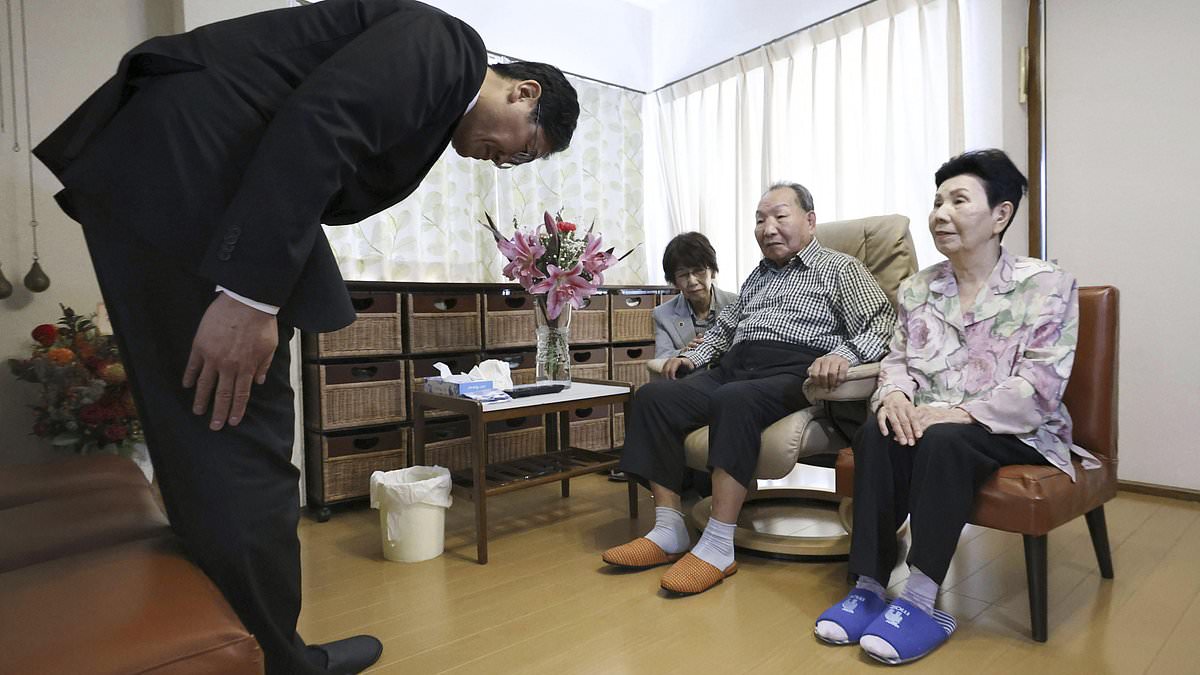This is the moment a Japanese police chief solemnly bowed and begged for forgiveness from a former boxer cleared of murder after 50 years on death row.
Shizuoka Prefectural Police chief Takayoshi Tsuda visited 88-year-old Iwao Hakamada at his home today to apologise after he was acquitted of a mass murder charge.
Mr Tsuda said, as he stood straight in front of Mr Hakamada and bowed deeply: ‘We are sorry to have caused you unspeakable mental distress and burden for as long as 58 years from the time of the arrest until the acquittal was finalised.’
‘We are terribly sorry,’ he added, assuring there would be a ‘meticulous and appropriate investigation’.
The Shizuoka District Court acquitted Mr Hakamada after admitting police and prosecutors had collaborated to fabricate and plant evidence against him.
Mr Hakamada had initially pleaded not guilty to stabbing four people to death in 1966, but confessed after 264 hours of intense and often violent interrogation. He has since maintained he was coerced and had no role in the killings.
As the police chief entered the room, Mr Hakamada silently rose from his sofa to greet him.
Mr Hakamada, who has difficulty carrying out conversation due to his mental condition from the decades of death row confinement, responded: ‘What it means to have the authority … Once you have the power, you’re not supposed to grumble.’
Mr Hakamada’s 91-year-old sister, who had stood by her brother through the long process to clear his name and now lives with him, thanked the police chief for visiting them.
‘There is no use complaining to him after all these years. He was not involved in the case and he only came here as his duty,’ she told reporters afterwards.
‘But I still accepted his visit just because I wanted (my brother) to have a clear break from his past as a death row inmate.’
The judgement came more than half a century too late for Mr Hakamada, who has spent most of his life behind bars since his arrest in 1966.
The former boxer had been charged with mass murder in a highly-publicised case dubbed the ‘Hakamada Incident’, after four bodies were found in the rubble of a house fire in Shizuoka, west of Tokyo.
Mr Hakamada’s employer, the employer’s wife and two children were found to have been stabbed to death in the home.
Authorities accused him of murdering the family, setting fire to the home and stealing 200,000 yen in cash.
Mr Hakamada, an employee at the victim’s miso processing plant at the time, denied having robbed and murdered the victims.
But he later confessed under what he said was duress and violent interrogation.
Mr Hakamada said he ‘could do nothing but crouch down on the floor trying to keep from defecating’ while detained.
‘One of the interrogators put my thumb onto an ink pad, drew it to a written confession record and ordered me, “Write your name here!” [while] shouting at me, kicking me and wrenching my arm.’
Two years after the incident, he was convicted of murder and arson, and sentenced to death.
Mr Hakamata was ultimately not executed because of the lengthy appeal and retrial process in Japan, and languished in prison for more than 50 years until last month, when he was acquitted in a retrial.
Japan often notifies prisoners on death row of their execution just minutes before, leaving Mr Hakamata uncertain of his fate for decades.
He holds the record for being the world’s longest-serving death row prisoner.
His lawyers continued to fight on his behalf, arguing that DNA recovered from purportedly bloodstained clothes used to incriminate him did not match.
Judge Hiroaki Murayama acknowledged in 2014 that ‘the clothes were not those of the defendant’.
Kumamoto Norimichi, one of three judges on his case, said during the trial that he did not believe there was enough evidence to convict him.
‘Looking at the evidence, there was almost nothing but the confession, and that had been taken under intense interrogation,’ he said.
Norimichi resigned after he was unable to convince the other two judges.
It took nearly three decades for the Supreme Court to deny Mr Hakamada’s first appeal for a retrial. His second appeal for a retrial, filed by his sister in 2008, was granted in 2014.
The court ordered his release from his death row solitary cell but without removing his conviction, pending the retrial process.
Mr Hakamada was the world’s longest-serving death row prisoner and only the fifth death row inmate to be acquitted in a retrial in post-war Japan, where criminal trials take years and retrials are extremely rare.
His case and acquittal have triggered calls for more transparency in the investigation, legal changes to lower hurdles for a retrial, as well as debate over the death penalty in Japan.
